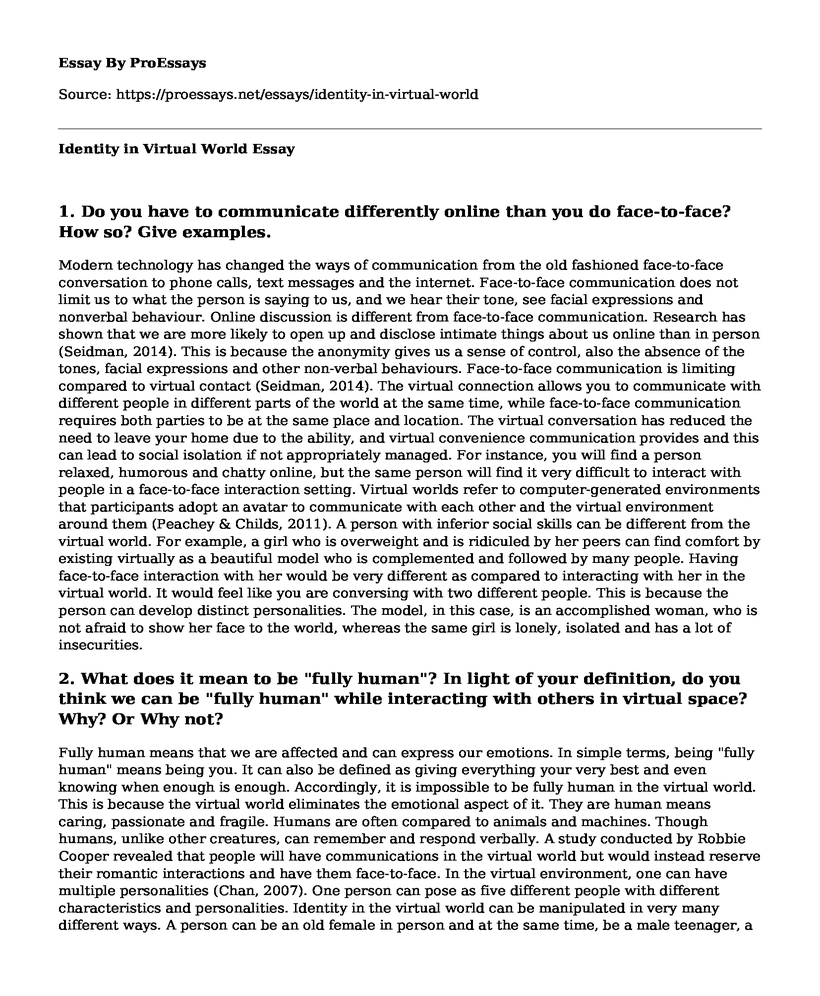1. Do you have to communicate differently online than you do face-to-face? How so? Give examples.
Modern technology has changed the ways of communication from the old fashioned face-to-face conversation to phone calls, text messages and the internet. Face-to-face communication does not limit us to what the person is saying to us, and we hear their tone, see facial expressions and nonverbal behaviour. Online discussion is different from face-to-face communication. Research has shown that we are more likely to open up and disclose intimate things about us online than in person (Seidman, 2014). This is because the anonymity gives us a sense of control, also the absence of the tones, facial expressions and other non-verbal behaviours. Face-to-face communication is limiting compared to virtual contact (Seidman, 2014). The virtual connection allows you to communicate with different people in different parts of the world at the same time, while face-to-face communication requires both parties to be at the same place and location. The virtual conversation has reduced the need to leave your home due to the ability, and virtual convenience communication provides and this can lead to social isolation if not appropriately managed. For instance, you will find a person relaxed, humorous and chatty online, but the same person will find it very difficult to interact with people in a face-to-face interaction setting. Virtual worlds refer to computer-generated environments that participants adopt an avatar to communicate with each other and the virtual environment around them (Peachey & Childs, 2011). A person with inferior social skills can be different from the virtual world. For example, a girl who is overweight and is ridiculed by her peers can find comfort by existing virtually as a beautiful model who is complemented and followed by many people. Having face-to-face interaction with her would be very different as compared to interacting with her in the virtual world. It would feel like you are conversing with two different people. This is because the person can develop distinct personalities. The model, in this case, is an accomplished woman, who is not afraid to show her face to the world, whereas the same girl is lonely, isolated and has a lot of insecurities.
2. What does it mean to be "fully human"? In light of your definition, do you think we can be "fully human" while interacting with others in virtual space? Why? Or Why not?
Fully human means that we are affected and can express our emotions. In simple terms, being "fully human" means being you. It can also be defined as giving everything your very best and even knowing when enough is enough. Accordingly, it is impossible to be fully human in the virtual world. This is because the virtual world eliminates the emotional aspect of it. They are human means caring, passionate and fragile. Humans are often compared to animals and machines. Though humans, unlike other creatures, can remember and respond verbally. A study conducted by Robbie Cooper revealed that people will have communications in the virtual world but would instead reserve their romantic interactions and have them face-to-face. In the virtual environment, one can have multiple personalities (Chan, 2007). One person can pose as five different people with different characteristics and personalities. Identity in the virtual world can be manipulated in very many different ways. A person can be an old female in person and at the same time, be a male teenager, a white male, or a small girl in the virtual world.
References
Chan, M. J. (2007). Identity in a virtual world. Retrieved from http://edition.cnn.com/2007/TECH/06/07/virtual_identity/index.html
Peachey, A., & Childs, M. (2011). Virtual worlds and identity. In reinventing ourselves: contemporary concepts of identity in virtual Worlds (pp. 1-12). Springer, London.
Seidman, G. (2014). Do We Reveal More in Person or on Our Electronic Devices? Retrieved from https://www.psychologytoday.com/intl/blog/close-encounters/201409/do-we-reveal-more-in-person-or-our-electronic-devices
Cite this page
Identity in Virtual World. (2022, Mar 11). Retrieved from https://proessays.net/essays/identity-in-virtual-world
If you are the original author of this essay and no longer wish to have it published on the ProEssays website, please click below to request its removal:
- Feminist Ethics Essay Example
- Introduction to Computer Security - Essay Sample
- Essay on Programmability - Program or Be Programmed
- Essay Sample on Virtue: Aristotle's Perspective on Exceptional Human Attributes
- Business Leaders: Role Model Duty for Ethical Practices - Research Paper
- Essay Example on Military Immunizations: Ethical Implications?
- Free Report Example on Striking Effect







